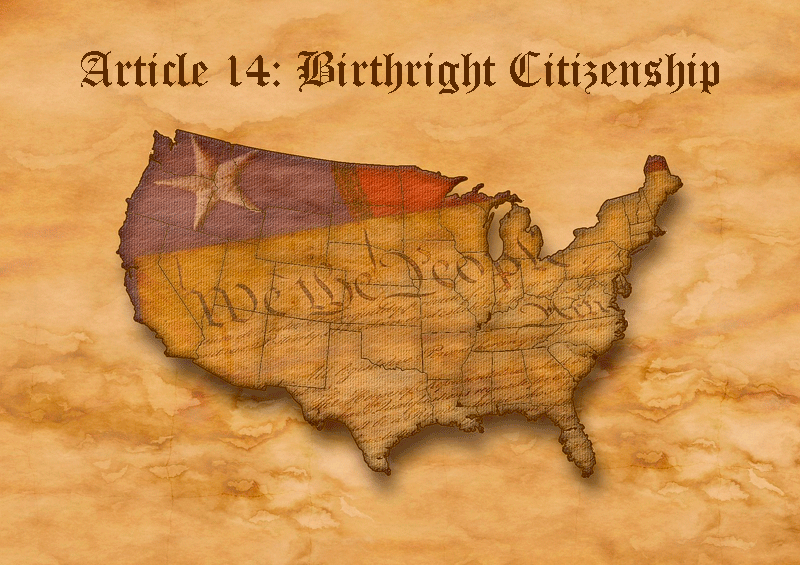
by Lil Tuttle
In an HBO interview aired Sunday, President Trump stated he planned to issue an executive order redefining “birthright citizenship” rules to deny U.S. citizenship to anyone born in the U.S. to temporary and unauthorized visitors. The current policy – giving U.S. citizenship to everyone born on U.S. soil – was crafted in the 1960s not by the courts or legislatures, but by federal agencies. Many constitutional scholars, who see current policy as a misinterpretation of the 14th Amendment, believe the President’s action will force a long-overdue constitutional review by the courts of the birthright citizenship issue that has become an irresistible magnet for illegal immigration.
The 14th Amendment states: All persons born or naturalized in the United States, and subject to the jurisdiction thereof, are citizens of the United States and of the state wherein they reside.
At issue is the meaning of the second requirement, “… and subject to the jurisdiction thereof…”
“Critics erroneously believe that anyone present in the United States has ‘subjected’ himself ‘to the jurisdiction’ of the United States, which would extend citizenship to the children of tourists, diplomats, and illegal aliens alike,” writes Hans von Spakovsky, Senior Legal Fellow at the Heritage Foundation. “But that is not what that qualifying phrase means.” Derived from the 1866 Civil Rights Act, Article 14 was designed to guarantee the citizenship rights of freed slaves.
In the famous Slaughter-House cases of 1872, the Supreme Court stated that this qualifying phrase was intended to exclude “children of ministers, consuls, and citizens or subjects of foreign States born within the United State.” This was confirmed in 1884 in another case, Elk vs. Wilkins, when citizenship was denied to an American Indian because he “owed immediate allegiance to” his tribe and not the United States.
Dr. John Eastman, Senior Fellow at the Claremont Institute and former dean of the Chapman School of Law, explains that the clause isn’t intended to mean “territorial” jurisdiction, as in obeying traffic laws (a requirement of everyone visiting or residing in the U.S.). Rather, the phrase encompasses the “allegiance-owing” jurisdiction of a person who is not subject to any foreign power. Dr. Eastman discussed the distinction in an interview with Laura Ingraham on Fox News:
J. Marsolo describes allegiance-owing jurisdiction this way:
If you are a naturalized citizen, you take an oath to defend the U.S. Constitution and renounce allegiance to foreign powers and thus subject yourself to the jurisdiction of the USA:
I hereby declare, on oath, that I absolutely and entirely renounce and abjure all allegiance and fidelity to any foreign prince, potentate, state, or sovereignty, of whom or which I have heretofore been a subject or citizen; that I will support and defend the Constitution and laws of the United States of America against all enemies, foreign and domestic; that I will bear true faith and allegiance to the same; that I will bear arms on behalf of the United States when required by the law; that I will perform noncombatant service in the Armed Forces of the United States when required by the law; that I will perform work of national importance under civilian direction when required by the law; and that I take this obligation freely, without any mental reservation or purpose of evasion; so help me God.
Executive Order vs Legislation
Some suggest that President Trump would be wise to narrowly focus his executive order “efforts on tourists and illegal immigrants,” while working with Congress to enact legislation that defines birthright citizenship more fully.
He has one Senate ally already. “Finally, a president willing to take on this absurd policy of birthright citizenship,” Senator Lindsey Graham (R-SC) announced in a statement.
The United States is one of two developed countries in the world who grant citizenship based on location of birth. This policy is a magnet for illegal immigration, out of the mainstream of the developed world, and needs to come to an end.
In addition, I plan to introduce legislation along the same lines as the proposed executive order from President Trump.
The birthright citizenship problem is not an insignificant one. A report by the Congressional Budget Office last year estimated the U.S, had at least 4.5 million “anchor babies” — children (of illegal aliens) who received U.S. citizenship at birth — under the age of 18. The number of American children born each year is estimated at only 4 million.
In announcing his intentions, President Trump has raised awareness of the birthright citizenship crisis facing the nation. With large caravans of more illegals approaching our southern border, Congress should be highly motivated to work with the President to legislatively clarify this issue as soon as possible.
